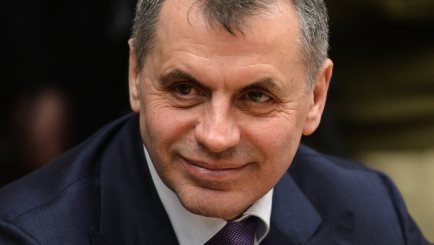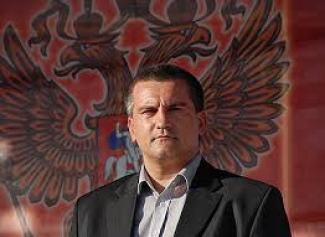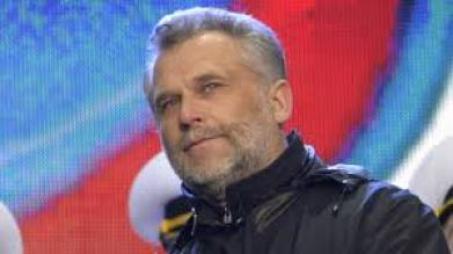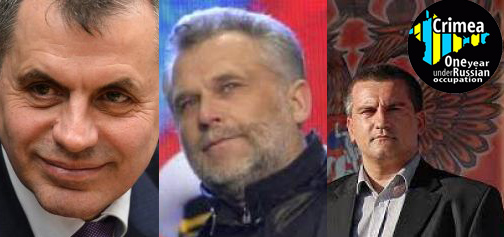On September 14 Russian “authorities” held elections in occupied Crimea, which saw a landslide victory of Putin’s United Russia (Yedinaya Rossiya) party, largely represented by old Crimean political elites. Russian independent newspaper Novaya Gazeta presented an overview of the winners.
Vladimir Konstantinov

Konstantinov, the speaker of Ukrainian Verkhovna Rada (Parliament) of Crimea, has been paying visits to Moscow since early 2014. It was probably then that he became a key figure of Russia's silent invasion operation. Konstantinov repeatedly threatened that the peninsula might reconsider its status if “anti-Russian” forces triumphed in Ukraine. The speaker’s construction company Console owed millions to Ukrainian banks, adding a personal incentive for him to work with Russia. The election put him into the role of the “Republic of Crimea” State Council speaker, “legitimizing” his former position.
Sergey Aksenov

Sergey Aksenov’s party Russian Unity (Russkoye Yedinstvo) had been operating in Crimea since 2010. Some suspect Aksenov’s campaign was financed by Ukrainian oligarch Dmytro Firtash, who had considerable assets in Crimea. However, Aksenov’s party enjoyed only a marginal success, managing to get only three MPs to the Crimean parliament. It was not until the Russian invasion when Aksenov rose to prominence. Selected from, according to sources, an array of 30 candidates, he was voted in as the Chairman of the Council of Ministers by MPs under the watchful eye of Russian gunmen. On October 9 the newly-elected State Council unanimously voted Aksenov in as head of Crimea, solidifying his control over the peninsula.
Aleksei Chalyi

While Aksenov and Konstantinov act as mere Yes men to Russian central government, Aleksei Chalyi has been a more prominent and independent figure. A local businessman from Sevastopol, he ran a high-tech company and supported local museums and schools. In 2014 he was behind the first pro-Russian rallies in Sevastopol prior to the invasion. His appearance in Kremlin at the signing of the Crimea annexation treaty in a black turtleneck in lieu of a formal suit shocked many and could be a factor to his relative downfall. Succeeded as the head of Sevastopol by ex-vice-commander of the Russian Black Sea fleet Sergey Menyailo, Chalyi got a rather modest position of the head of United Russia faction in Sevastopol’s town council.
Party of Regions
For the last decade Crimea has been the most solid electoral base of former Ukrainian President Victor Yanukovych’s Party of Regions. While before 2010 key posts were occupied by local “Regionals,” after Yanukovych’s election control was taken by bureaucrats from his native region of Donetsk. The newcomers got on the shady corruption deals, allocating huge chunks of land to offshore companies belonging to Yanukovych’s cronies. The annexation prompted the downfall of the Donetsk guard, and United Russia’s electoral list consisted of the old Crimean Party of Regions members and Aksenov’s inner circle (the latter including two of his close relatives, probably for the lack of other suitable candidates). The former have outlived several Ukrainian presidents and may be hoping to outlive Putin himself.
Crimea, Novaya Gazeta argues, is a safe haven for officials and party men compared to the uncertain future of their colleagues in mainland Ukraine. They support Moscow for preserving the status quo, allowing them to remain in power and keep control of their assets. However, the article concludes, it is most likely a mere alliance of convenience, despite the rhetoric, and in case of a political climate change it’s easy to see Crimean elites start looking the other way – again.

